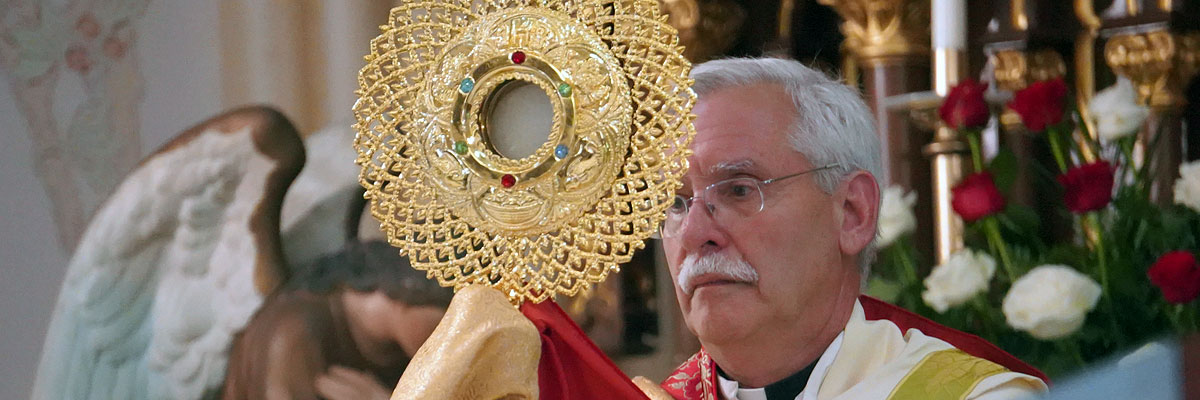Official Website of the
Catholic Diocese of Little Rock
Feast of St. Callistus I, Pope and Martyr
Published: October 14, 2016
Bishop Anthony B. Taylor preached the following homily during the travelers’ Mass for the Equestrian Order of the Holy Sepulchre of Jerusalem at the Cathedral of St. Andrew in Little Rock on Friday, Oct. 14, 2016.

Bishop Taylor
The early Church saw itself as allied with God and all the angels who were engaged in a cosmic struggle between good and evil — in the heavens, on the earth and under the earth. Today, we celebrate the feast of Pope St. Callistus I who had been in charge of the first official Christian cemetery in Rome.
Probably some of you have visited these catacombs en route to the Holy Land on pilgrimage. As we know, he met a violent death in a time of persecution. We see this same struggle between good and evil in today's Gospel where Jesus warns his hearers of the "hypocrisy of the pharisees."
Both Jesus and St. Callistus faced conflict because they confronted evil, but they did so non-violently. That is why their witness remains so powerful today.
As Knights and Ladies of the Holy Sepulchre, it is our duty to do what we can to set things right and it is Jesus emerging from that holy sepulchre on Easter Sunday morning who teaches us how to conduct this battle.
We Knights and Ladies of the Holy Sepulchre trace our origins to the Crusades 1,000 years ago, another moment in this same struggle between the forces of good — with which we were allied, and the forces of evil — the infidels who had conquered the Holy Land were denying Christians access to the holiest places of our faith.
This included Calvary, where Jesus died, and the holy sepulchre where he was buried, and from which he rose from the dead on Easter Sunday, victorious over sin and death.
Jerusalem is where the decisive battle in the struggle between good and evil was fought and won. The forces of evil did their worst, but Jesus continued to love anyway. They mocked him, whipped him, humiliated him — stripped him naked for all to see, crowned him with thorns, nailed him and mocked him some more, yet not only did he return no insult, he forgave them.
He was so determined to love everyone, no matter what, that not even the worst evils imaginable could break his will. And so even though he died, it was Satan who was defeated and Jesus who prevailed.
And not only did he forgive those who hated him, he also forgave his friends who had abandoned him, which is probably what hurt him the most, yet when he returned it was to say: “Peace be with you.” Jesus’ holy sepulchre proclaims eloquently the power of sacrificial love, over which the power of darkness cannot prevail.
You and I are aware that those crusaders from 1,000 years ago had their blind spots. Like us, they were subject to the limitations of their time and place. Looking back with 20/20 hindsight, we are inspired by their courage and self-sacrifice, but we are also disedified by acts of cruelty that were simply typical of that harsher time.
Just like us, they were not as “good” as we might have hoped, and their enemies were not as diabolical as the crusaders thought — indeed there is an astonishing mixture of good and evil in every human soul, ours included. As we say: “There is so much evil in the best of us and so much good in the worst of us that it ill behooves any of us to speak badly of the rest of us.”
And so, the struggle between good and evil continues in our world today; in an America largely given over to the culture to death and in a Middle East where Christians are once again under siege, caught in the middle of a conflict between others, squeezed out, the casualties of a struggle that is not their own.
As Knights and Ladies of the Holy Sepulchre, it is our duty to do what we can to set things right and it is Jesus emerging from that holy sepulchre on Easter Sunday morning who teaches us how to conduct this battle.
We won’t defeat evil militarily. Military victories are just temporary — that was the biggest mistake of the Crusades. If we want to win these battles — above all against abortion — but also the other evils of our day, it will not be through coercion but rather through persuasion, the persuasive, redemptive power of sacrificial love.
The cross of Jesus and our own crosses embraced with love and united to that of Jesus, the cross of sacrificial love, over which the powers of darkness cannot prevail!









